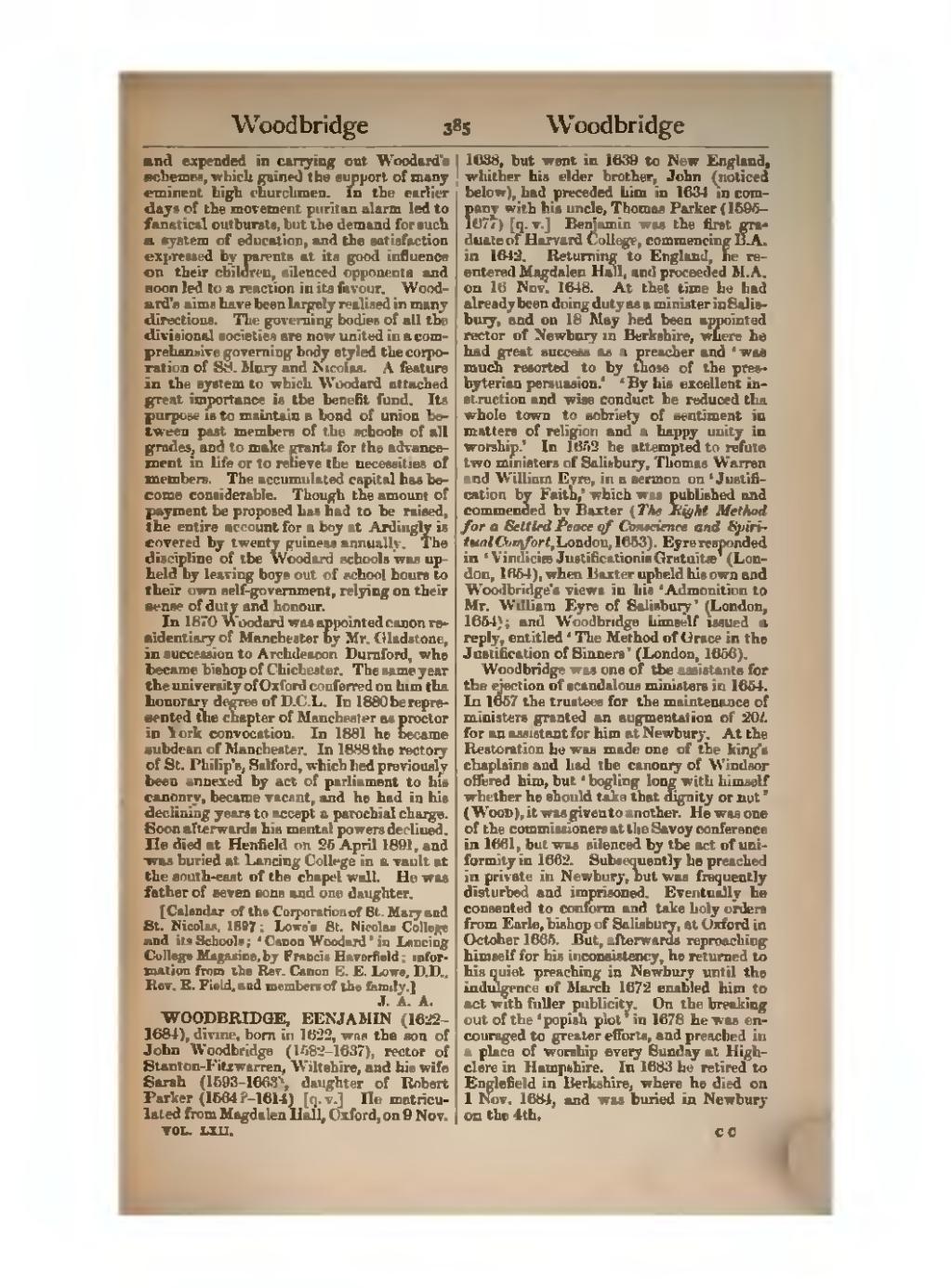and expended in carrying out Woodard's schemes, which gained the support of many eminent high churchmen. In the earlier days of the movement puritan alarm led to fanatical outbursts, but the demand for such a system of education, and the satisfaction expressed by parents at its good influence on their children, silenced opponents and soon led to a reaction in its favour. Woodard's aims have been largely realised in many directions. The governing bodies of all the divisional societies are now united in a comprehensive governing body styled the corporation of SS. Mary and Nicolas. A feature in the system to which Woodard attached great importance is the benefit fund. Its purpose is to maintain a bond of union between past members of the schools of all grades, and to make grants for the advancement in life or to relieve the necessities of members. The accumulated capital has become considerable. Though the amount of payment he proposed has had to be raised, the entire account for a boy at Ardingly is covered by twenty guineas annually. The discipline of the Woodard schools was upheld by leaving boys out of school hours to their own self-government, relying on their sense of duty and honour.
In 1870 Woodard was appointed canon residentiary of Manchester by Mr. Gladstone, in succession to Archdeacon Durnford, who became bishop of Chichester. The same year the university of Oxford conferred on him the honorary degree of D.C.L. In 1880 he represented the chapter of Manchester as proctor in York convocation. In 1881 he became subdean of Manchester. In 1888 the rectory of St. Philip's, Salford, which had previously been annexed by act of parliament to his canonry, became vacant, and he had in his declining years to accept a parochial charge. Soon afterwards his mental powers declined. He died at Henfield on 25 April 1891, and was buried at Lancing College in a vault at the south-east of the chapel wall. He was father of seven sons and one daughter.
[Calendar of the Corporation of St. Mary and St. Nicolas, 1897; Lowe's St. Nicolas College and its Schools; ‘Canon Woodard’ in Lancing College Magazine, by Francis Haverfield; information from the Rev. Canon E. E. Lowe, D.D., Rev. E. Field, and members of the family.]
WOODBRIDGE, BENJAMIN (1622–1684), divine, born in 1622, was the son of John Woodbridge (1582–1637), rector of Stanton-Fitzwarren, Wiltshire, and his wife Sarah (1593–1663), daughter of Robert Parker (1564?–1614) [q. v.] He matriculated from Magdalen Hall, Oxford, on 9 Nov. 1638, but went in 1639 to New England, whither his elder brother, John (noticed below), had preceded him in 1634 in company with his uncle, Thomas Parker (1595–1677 ) [q. v.] Benjamin was the first graduate of Harvard College, commencing B.A. in 1642. Returning to England, he re-entered Magdalen Hall, and proceeded M.A. on 10 Nov. 1648. At that time he had already been doing duty as a minister in Salisbury, and on 18 May had been appointed rector of Newbury in Berkshire, where he had great success as a preacher and 'was much resorted to by those of the presbyterian persuasion.' 'By his excellent instruction and wise conduct he reduced the whole town to sobriety of sentiment in matters of religion and a happy unity in worship.' In 1652 he attempted to refute two ministers of Salisbury, Thomas Warren and William Eyre, in a sermon on 'Justification by Faith,' which was published and commended by Baxter (The Right Method for a Settled Peace of Conscience and Spiritual Comfort, London, 1663). Eyre responded in 'Vindiciæ Justificationis Gratuitae' (London, 1654), when Baxter upheld his own and Woodbridge's views in his 'Admonition to Mr. William Eyre of Salisbury' (London, 1654); and Woodbridge himself issued a reply, entitled 'The Method of Grace in the Justification of Sinners' (London, 1656).
Woodbridge was one of the assistants for the ejection of scandalous ministers in 1654. In 1657 the trustees for the maintenance of ministers granted an augmentation of 20l. for an assistant for him at Newbury. At the Restoration he was made one of the king's chaplains and had the canonry of Windsor offered him, but 'bogling long with himself whether he should take that dignity or not' (Wood), it was given to another. He was one of the commissioners at the Savoy conference in 1661, but was silenced by the act of uniformity in 1662. Subsequently he preached in private in Newbury, but was frequently disturbed and imprisoned. Eventually he consented to conform and take holy orders from Earle, bishop of Salisbury, at Oxford in October 1665. But, afterwards reproaching himself for his inconsistency, be returned to his quiet preaching in Newbury until the indulgence of March 167S enabled him to act with fuller publicity. On the breaking out of the 'popish plot' in 1678 he was encouraged to greater efforts, and preached a place of worship every Sunday at Highclere in Hampshire. In 1683 he retired to Englefleld in Berkshire, where he died 1 Nov. 1684, and was buried in Newbury on the 4th.
